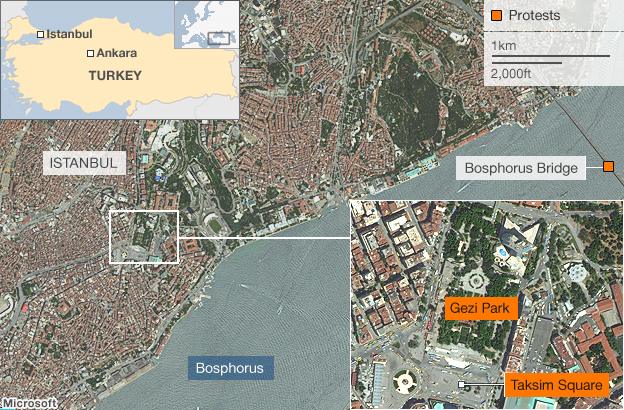Turkey protests: Clashes rage in Istanbul's Besiktas
- Published
A bulldozer made its way towards the prime minister's office, as James Reynolds reports
Turkish protesters have clashed with police in Istanbul overnight, in some of the worst violence since unrest erupted three days ago.
Protesters in Besiktas district tore up paving stones to build barricades, and police responded with tear gas and water cannon.
The violence was sparked by plans to build on a city park but have broadened into nationwide anti-government unrest.
Protesters say the Turkish government is becoming increasingly authoritarian.
They fear Prime Minister Recep Tayyip Erdogan's Justice and Development Party (AKP) is trying to impose conservative Islamic values on the officially secular country and infringe on their personal freedoms, correspondents say.
Officials say more than 1,700 people have been arrested in demonstrations in 67 towns and cities, though many have since been released.
Late on Sunday, the White House said in a statement that all parties should "calm the situation", and reaffirmed that peaceful demonstrations were "part of democratic expression".
The US previously criticised the security forces for their initial response to the protest.
Roads sealed off
Mosques, shops and a university in Besiktas were turned into makeshift hospitals for those injured in Sunday night's demonstration.
Several thousand people took part in the protest outside the recently decommissioned Besiktas football stadium.
Observers say some of the protesters were coughing violently and vomiting after police fired gas canisters into the crowd.
Nearby, police also battled to protect the prime minister's office, which became another focal point for the protesters.
They were said to have sealed off roads surrounding Mr Erdogan's office in a bid to push back protesters.
Unrest was also reported in the capital, Ankara, and the western coastal city of Izmir, as well as Adana in the south and Gaziantep in the south-east.
Police raided a shopping complex in central Ankara where they believed demonstrators were sheltering, Reuters news agency reported.
According to the Turkish Doctors' Association, 484 protesters have been treated in hospitals in Istanbul since Friday.
'A few looters'
Many of the protesters in Istanbul appear to be young and urban middle class.
Last week, the government passed legislation curbing the sale and advertising of alcoholic drinks.
Mr Erdogan says the protesters are undemocratic and have been provoked by the opposition Republican People's Party (CHP).
Speaking in a televised interview on Sunday, the prime minister dismissed those taking part in protests as "a few looters" and strongly criticised social media sites, singling out Twitter, which he said was "an extreme version of lying".
On Sunday, the area around Gezi Park, where the protests first erupted, was largely peaceful.
But after police used tear gas and water cannon to disperse demonstrators, triggering accusations of excessive force, the numbers swelled in nearby Taksim Square.
The protests began on a small scale last week over redevelopment plans for the park to make way for the rebuilding of an Ottoman-era barracks, reportedly to house a shopping centre.
The demonstrators say the park is one of the few green spaces in Istanbul, and object to the loss of public space for commercial purposes.

- Published2 June 2013
- Published3 June 2013
- Published1 June 2013
- Published24 October 2012
- Published24 May 2013
- Published30 September 2012